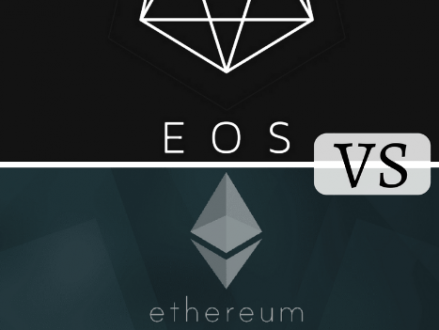

There’s never a dull moment in the cryptocurrency industry – each new day throws up a fresh set of realities in which the narrative of the market continues to change. Cryptocurrencies made their debut on Wall Street with Bitcoin, but it wasn’t long before traditional financial institutions, tech firms, and governments agencies began hyping up Ethereum as a potentially better blockchain product than Bitcoin.
Initiatives such as the Ethereum Enterprise Alliance also helped to reinforce the notion that Ethereum might have better long-term prospects than Bitcoin. Now, EOS, a new kid on the cryptocurrency block is challenging the prospects of Ethereum’s market dominance.
In just a few months after its debut, EOS has grown to become the fifth largest cryptocurrency by market cap. In the year-to-date period, the trading price of EOS cryptocurrency has soared by more than 112% whereas the price of Ethereum has declined by almost 13% in the same period. More interesting is the fact that some cryptocurrency analysts believe that EOS could potentially overtake Ethereum in terms of market dominance by 2020.
Ethereum and EOS are competitors in the decentralized applications (DApp) marketplace. Ethereum is a blockchain that provides a platform to create and run Smart Contracts, create Dapps, and eliminate the need for brokers when conducting transactions. EOS is a rival blockchain that offers a similar Smart Contract platform for creating Dapps for enterprise use cases. This article provides insight into the fledgling rivalry between Ethereum and EOS as both blockchains fight for market dominance in the enterprise applications of blockchain technology.
Here’s why EOS is getting more buzz than Ethereum lately
Ethereum and EOS are similar platforms designed to create enterprise applications for blockchain technology beyond the current hype of cryptocurrencies. However, the differences between both platforms are evident in the technical disparities of their operation.
A superior consensus protocol
Starting with consensus protocols, Ethereum’s consensus is built around a Proof-of-Work (PoW) consensus in which miners are required to show the proof of the speed at which they can verify transactions in order to earn rewards. One of the major problems of Ethereum’s PoW consensus protocol is that it can only process an average of 15 transactions per second. Another limitation of Ethereum’s PoW consensus protocol is that it is practically impossible developers on Ethereum’s blockchain to fix errors in their Dapps, and they must resort to a forking mechanism to fix problems.
In contrast, EOS employs a delegated Proof-of-Stake (PoS) consensus protocol in which miners are only required to set aside a predefined number of tokens to earn the right to create masternodes – owning master nodes, in turn, helps the miners earn rewards for facilitating functions such as instant transactions across the network.
The PoS consensus protocol also gives EOS incredibly faster transactions times of as much as 1000 transactions per second. More importantly, the delegated PoS protocol makes it possible to fix problematic Dapps of the EOS blockchain without necessarily compromising the immutability of other Dapps or blocks. The PoS consensus makes it easy to freeze the network so that faulty Dapps can be fixed in isolation.
A growing community of developers
The second reason EOS has earned the nomenclature of being “Ethereum’s killer” is the fact that EOS has a low barrier to entry for developers because of its openness to programming languages. On Ethereum, developers must learn Solidity because you can only write Dapps using Ethereum’s native language. The insistence on writing DApps in Solidity is often a turn off for some developers who are merely curiously trying out their hands on blockchain projects.
In contrast, EOS allows developers to write Dapps in any programming language of their choice, inasmuch as the language can be compiled using Web Assembly (WASM). Interestingly, WASM supports compilation in C and C++, developers can compile Rust through LLVM, C# can be compiled with support from Blazor, and they can compile Java by leveraging Bytecoder. In essence, EOS has better odds of building a vibrant and resourceful developer community because it appeals to a large cross-section of developers.
Bitcoin address : 3311fRxXNxgJp8mw6xv78zv5Dy6EbHzEWY

Hi! I am a robot. I just upvoted you! I found similar content that readers might be interested in:
https://www.cryptoninjas.net/2018/05/02/eos-versus-ethereum-does-eos-hype-as-ethereum-killer-hold-any-validity/
Downvoting a post can decrease pending rewards and make it less visible. Common reasons:
Submit
EOS is here to compete but I feel ethereum is one such coin that no coin can replace now
Downvoting a post can decrease pending rewards and make it less visible. Common reasons:
Submit